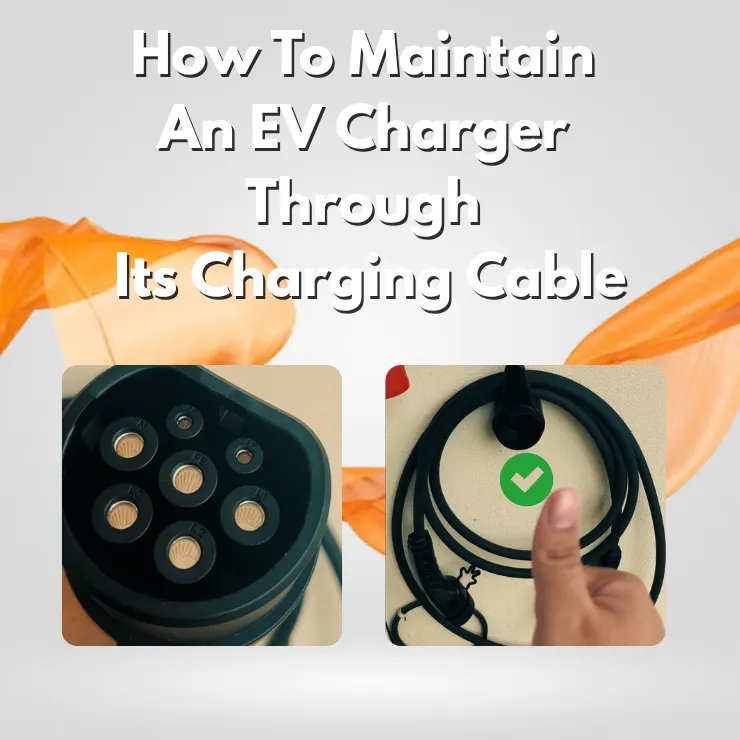Perhaps you’ve been considering buying an electric vehicle but aren’t quite optimistic about EV charging costs, which may be the reason why it’s stopping you from making the purchase.
This article aims to assist you in calculating charging costs for home and public use and shed light on the various charge point operators offering public EV charging services.
EV charging costs in Malaysia
EV Charging Costs Levels: 1,2,3
| Featured Charging | Level 1 (AC) | Level 2 (AC) | Level 3 (DC) |
| Cost Average Comparison | 3-Pin Plug : Rm10-20/charge | Home Wallbox : Rm20-40/charge | Public Charging : RM60-120/charge |
| Usage Recommendation | Ideally to those who drive less than 100 km a day and have a lot of time to spare for charging. | For those who don’t want to spend the extra on DC fast charging while remaining faster than Level 1 charging speeds. | It features the fastest charging speeds and is usually for those who commute regularly and do interstate travel. |
*Calculate Your Home Installation Cost
Things to consider that would affect EV charging costs
- Daily usage pattern: Do you utilise features that would increase battery life and quite possibly increase its range? Regenerative braking is one of the few EV technologies that returns the motion of braking as a reusable energy source for the battery. Not taking advantage of this leaves more charging hours, leading to increased costs.
- Urban or Highway drives—If your general drive involves urban landscapes, battery depletion is considerably less than that of highway driving, as there is more traffic and more stops to make at every intersection to benefit from regenerative braking.
- Driving habits (Fast driver) or (Slow driver) Faster acceleration demands more electricity to drive the motors, meaning that the motors work harder to maintain or provide the speed at which you’re driving
- The efficiency of EVs through torrential weather could suffer as more air resistance towards the EV, increasing the drag coefficient would mean the EV uses more battery to move through than in dry weather.
The basis for calculating the EV charging costs in Malaysia
Referencing a report in 2018 by the Malaysian Institute of Road Safety Research, the average kilometres travelled in a month within Peninsular Malaysia is 2,349km, when calculated for a year, adds up to around 28,000 km a year. Considering those numbers, we can derive the average cost of charging based on the range that needs to be covered yearly by EVs
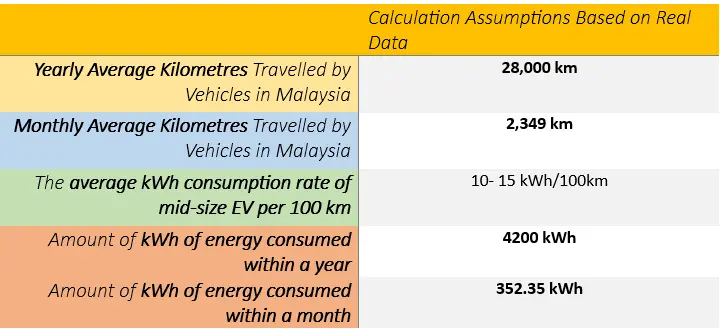
EV charging costs at home (AC charging)
Users who opt to charge at home are charged differently following TNB’s residential tariffs. The implementation of home charging also requires the installation of a usable EV charging unit. The cost of buying a standalone EV charging wall box can be browsed through this list of EV chargers available to purchase.
TNB’s electricity tariffs that alter the EV charging costs at Home
Residential electricity tariffs are differentiated based on household usage, in which a higher tariff is imposed on those with higher amounts of electricity. The tariff starts at RM0.21 per kWh for the lowest tier block of kWh usage of up to 200kWh until the next tariff increase. The following is the full residential tariff from TNB
- First 200kWh per month: RM0.218 sen/kWh
- Next 201k – 300kWh per month: RM0.334 sen/kWh
- Next 301k – 600kWh per month: RM0.516 sen/kWh
- Next 601k – 900kWh per month: RM0.546 sen/kWh
- Next 901kWh onwards per month: RM0.571 sen/kWh
Yearly and monthly average of EV Charging cost at home

Public EV charging cost
EV charging cost using charging point operators (CPO)
Things to consider – idle fee, parking reservation fee – some providers of public EV charger services charge a reservation fee that could lead to additional costs for charging your EV in public. Finding the stations is relatively easy as they can be tracked through applications. The charging cost varies according to the provider and type of charging station.
Types of EV public charging stations units in Malaysia:
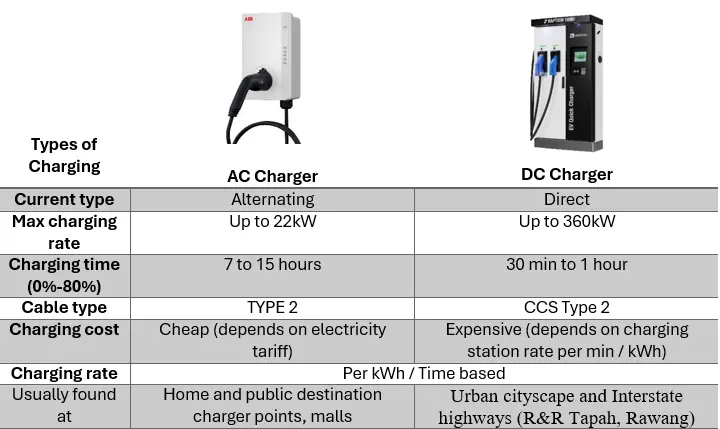
Yearly and monthly average for EV charging costs at ChargEV stations
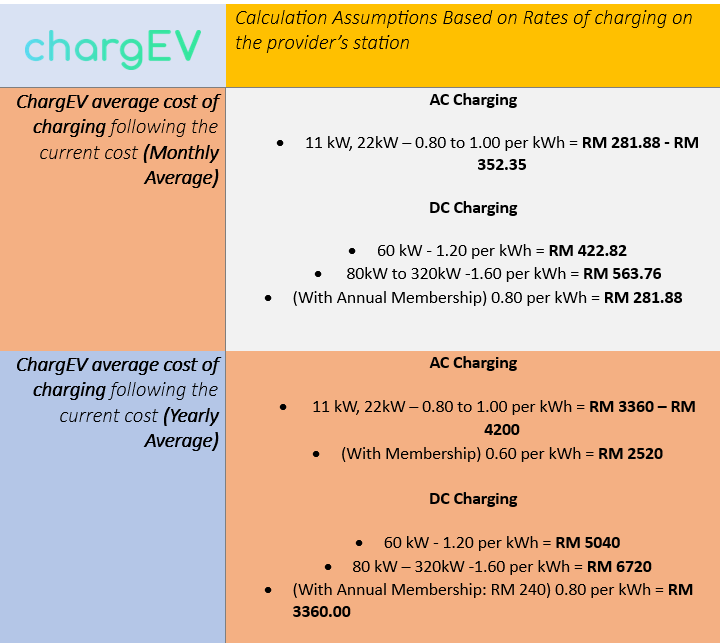
Yearly and monthly average for EV charging costs at Gentari stations
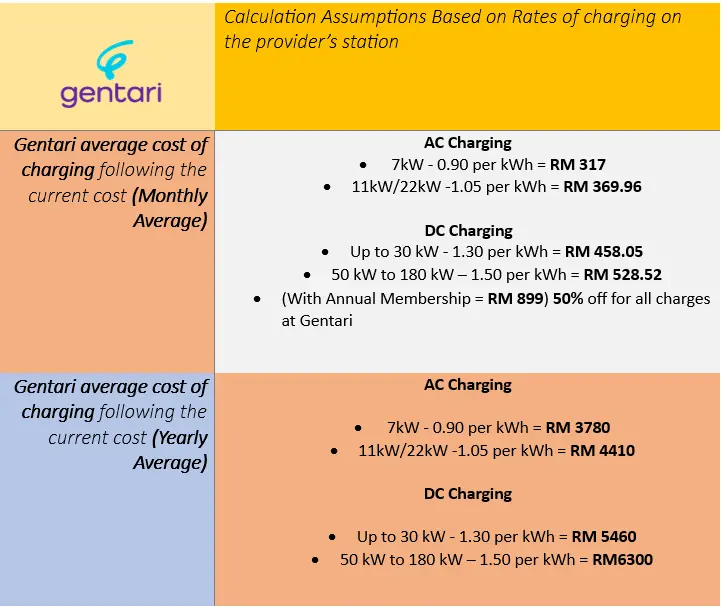
Yearly and monthly average for EV charging costs at Shell Recharge stations
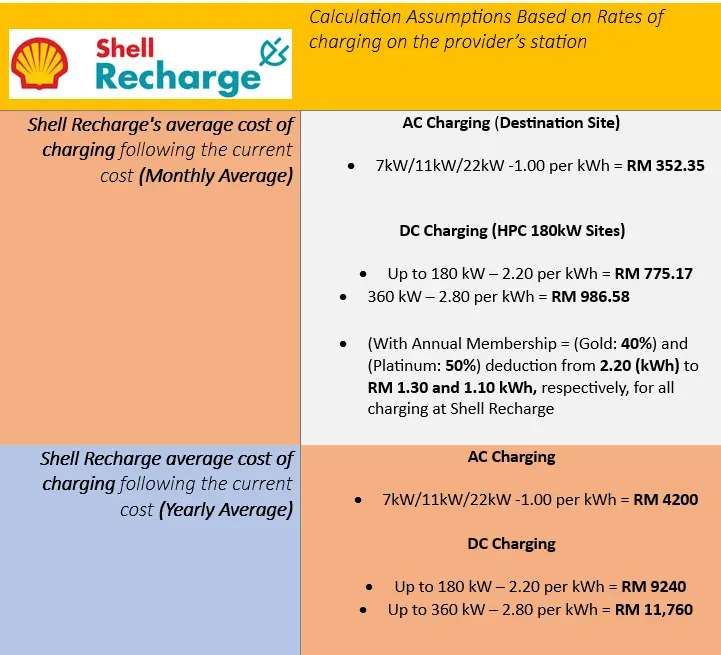
Yearly and monthly average for EV charging costs at Tesla charging stations
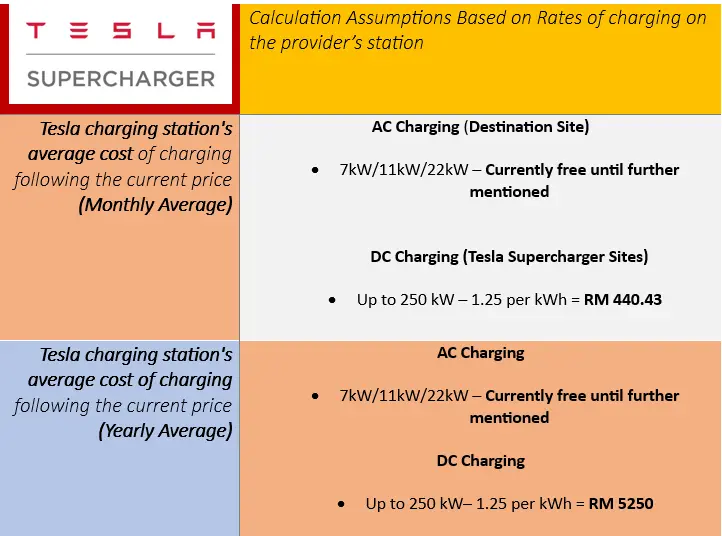
EV Charging cost based on a per-minute basis
Some public stations offer a charge rate that follows time-based usage. However, charge operators are slowly reforming from their original time-based to per-kWh rates following providers such as Gentari. TNB Electron is a charge operator with time-based charging implemented within its charging stations located at R&Rs that fled southbound and northbound. The pricing of their charging platforms can be found on TNB’s website. Charge EV is also another CPO that has its time-based kWh charging.
ChargEV station’s cost of time-based charging

TNB Electron’s cost of charging is based on yearly, monthly usage and time-based
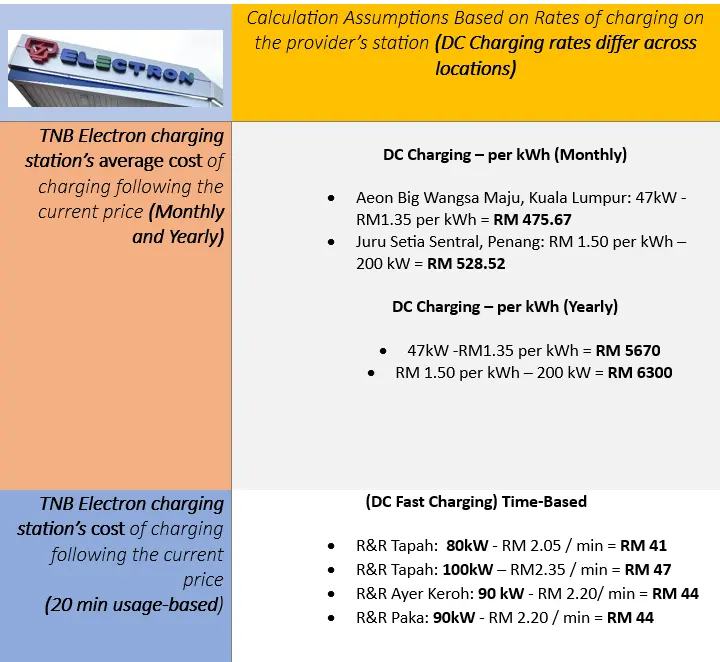
Actual Charging cost from real-life usage pattern
Actual charging patterns from social media, Facebook, and Malaysian EV Owners groups that highlight interstate travel with a combined usage of Home-based charging plug points and public chargers invested throughout the interstate route. The prices are an indication of the amount of kWh consumed from various charging kWh speeds
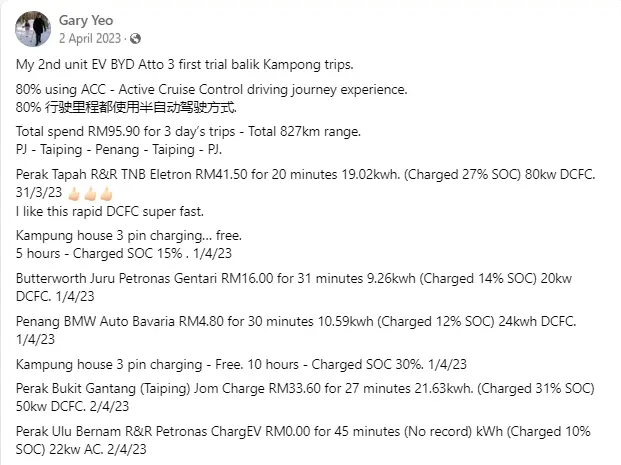
Another post that shares a different user’s charging cost travel covering from KL to Penang on his BMW iX2 in which he claimed to have driven at a constant speed of 100km/h – 140km/h.
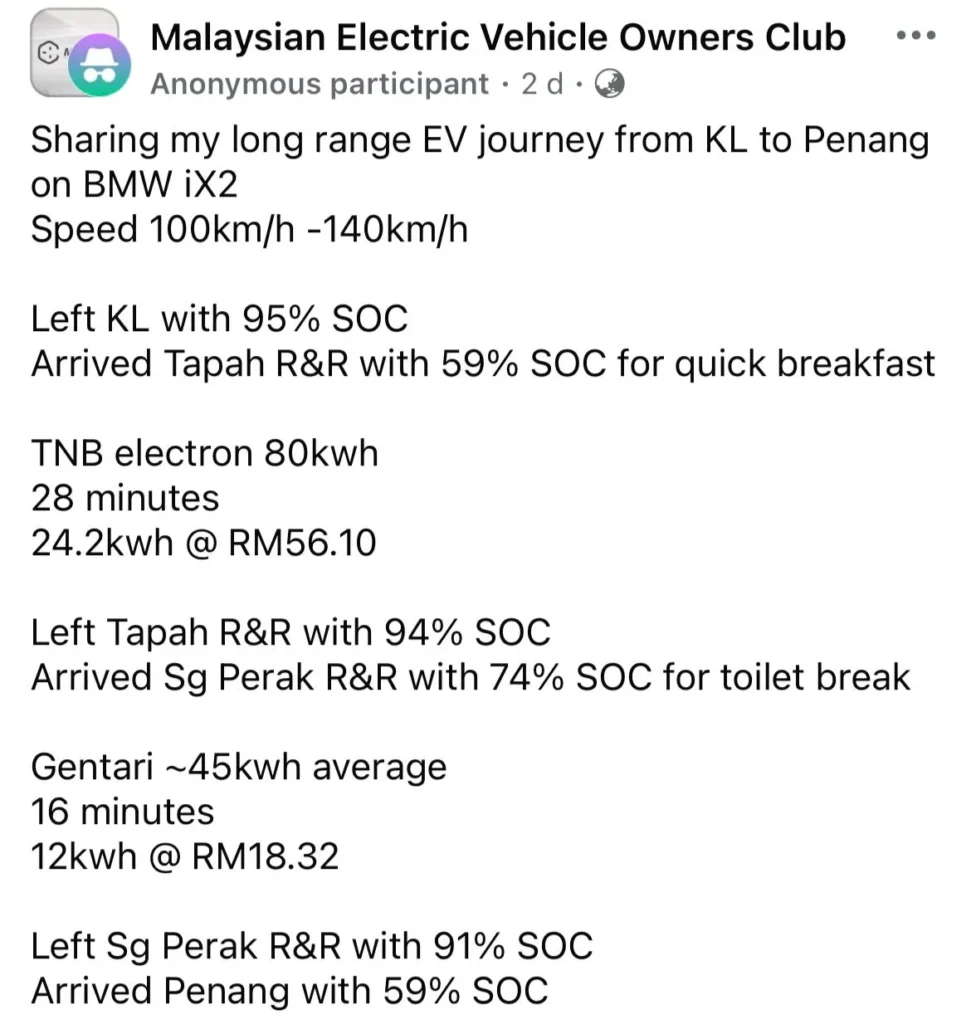
As evident by the shares above, the kWh charging following the user’s route varies due to the different charging stations along the way. The calculations can be done by adding up the kWh gained from charging at each point with the respective charges that the provider has already set.
Tips on saving on costs for charging.
Cheaper charging through AC Charging
If you’re on the road and have ample time to spare, consider charging your vehicle with AC instead of DC. Costs can be reduced with the exception that you are quick at taking off after a full charge, as some stations charge an idle fee for prolonged usage of the charging bay after the period for charging service that has lapsed
Charging cost of EV deductible from solar
Owners that adopted solar panelling to the electricity system of their housing in Malaysia have had further deductions from their TNB billing despite also utilising EV charging for their EVs. This is due to NEM’s (Net Energy Metering Scheme) encouragement towards Malaysia’s Renewable Energy (RE) uptake, where the excess energy is turned into an opportunity to re-sell back to the grid. This, in return, grants owners a deduction towards their monthly electricity billing for the generation of kWh blocks that the solar panel does.
The following is a user on Facebook under Malaysian EV Owners Club who shared estimates that RM 250 is what went towards his EV charging while home electricity usage is RM 50
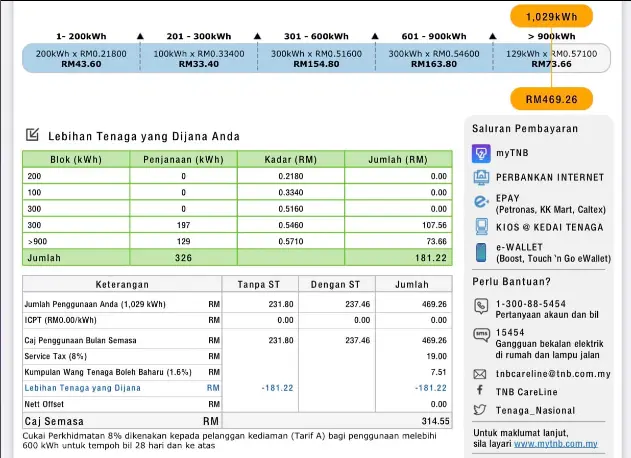
Conclusion
Of course, the calculations covered in this article don’t reflect your personal usage as they vary within your daily range and pattern of driving your EV. The variable that often changes is how you usually utilise home and public charging. The calculations here broadly show that home charging costs are significantly lower compared to utilizing CPO infrastructure for charging your EV and that per-kWh is the way to go for fairness in charging for EVs.




